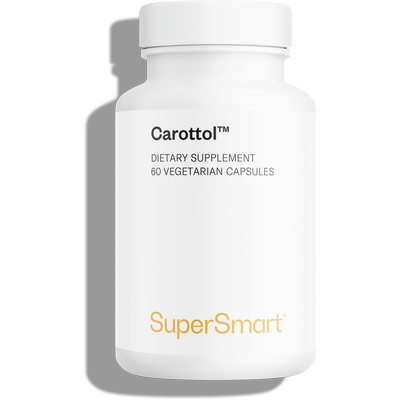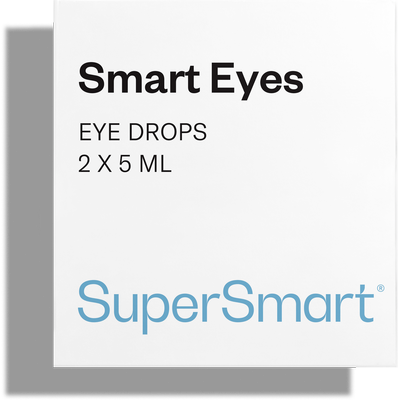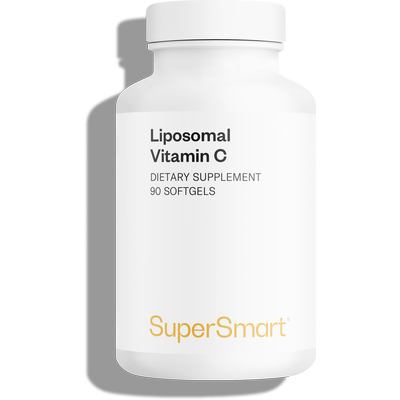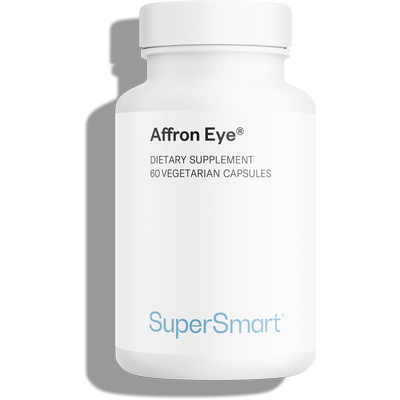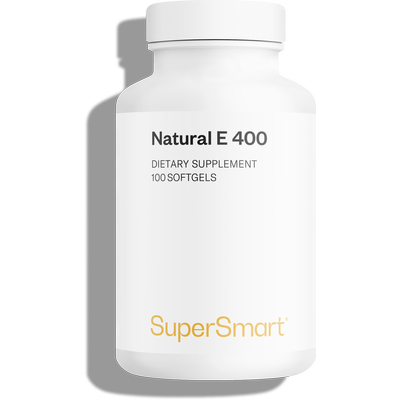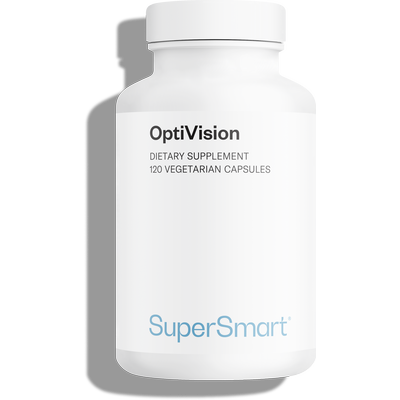What are the best vitamins for eye health?
It’s important to take care of your vision throughout life. But do you know which vitamins, one in particular, are essential for the health of your eyes?

3 vitamins important for the eyes
Vitamin B2 for maintaining healthy vision
Let’s start with vitamin B2 (also known as riboflavin), which plays a part in maintaining normal vision by helping to protect ocular cells against oxidative stress.
Our eyes are subject to high levels of oxidative stress from a range of external sources such as pollution, UV rays, dust, blue light from screens, tobacco smoke… What’s more, the eyes’ high metabolic activity itself generates large numbers of free radicals. The resulting oxidative stress can lead to premature ageing of the eye as well as to the development of certain eye diseases.
In addition to its antioxidant action, vitamin B2 works by:
- helping to maintain clarity of the cornea, the clear outer layer of the eye;
- reducing the risk of cataract (gradual opacification of the lens of the eye);
- supporting normal metabolism of energy which enables sufficient levels to reach energy-hungry retinal cells;
- helping to maintain normal mucous membranes including those lining the inside of the eyelids and surface of the eye (1).
Vitamin B2 is found in dairy products, eggs, green vegetables and nuts. You can ensure a good intake of the various B vitamins (including B2) by taking a B vitamin complex.
Vitamin C, a key antioxidant for eye health
Next comes vitamin C, a champion in the fight against oxidative stress. Its powerful antioxidant effects are excellent for every aspect of health including vision (2).
But that’s not all: vitamin C also supports the immune system, which can help protect the eyes from infections and inflammation.
Which foods contain vitamin C? Good sources include citrus fruits (oranges, grapefruit…), as well as green peppers and tomatoes. In terms of supplements, you could opt for liposomal vitamin C for maximum efficacy.
Vitamin E: another essential antioxidant for the eyes
Let’s not forget vitamin E, another important antioxidant which complements vitamins B2 and C in protecting the eyes against oxidative damage (3).
Dietary sources of vitamin E include wheat germ oil, sunflower seeds, Brazil nuts and avocados, or for higher doses, there are vitamin E supplements.
Vitamin A, the cornerstone of eye health
Vitamin A’s central role in eye health
Of course, all vitamins (and nutrients in general) have an important and complementary role to play in eye health.
But of all the different vitamins that help maintain healthy vision, vitamin A can be considered the absolute cornerstone.
What are vitamin A’s benefits for vision?
In terms of eye health, current research suggests that vitamin A plays a role in:
- preventing blindness, since prolonged vitamin A deficiency can lead to retinal degeneration and potential loss of sight;
- eye lubrication;
- corneal health (the clear layer covering the iris and pupil);
- preventing infections, by supporting the barrier function of the cornea and conjunctiva (the clear membrane covering the white of the eye and inside of the eyelid). Vitamin A thus seems to help protect the eyes from pathogens and infections (such as conjunctivitis);
- night vision, vitamin A being essential for the formation of rhodopsin (a pigment sensitive to low-intensity light, present in retinal photoreceptor cells);
- maintaining healthy blood vessels in the retina, vital for clear and sharp vision;
- reducing inflammation in the eyes, in the case of certain forms of vitamin A such as the retinoids (retinol, for example);
- cell specialisation, ocular cells requiring regular renewal;
- eye development in childhood;
- preventing macular degeneration, vitamin A having been shown to help reduce the risk of certain forms of age-related macular degeneration (AMD), etc. (4-8)
Where is vitamin A found?
Substantial amounts of vitamin A in the form of retinol are found in animal-source products: beef and chicken liver, oily fish, eggs, dairy products…
Certain plant-source foods also contain good levels of beta carotene, a vitamin A precursor. Carrots, sweet potatoes, spinach, mango and melon are particularly good sources of beta carotene, though the conversion rate of beta-carotene to retinol can vary depending on individual metabolism and other factors.
To ensure an excellent intake of vitamin A, you could also take a dietary supplement that combines a number of natural carotenoids including beta carotene, (such as Carottol).
In some supplements, retinol is combined with other nutrients known to be good for vision, such as anthocyanosides from blueberries (one such product is the synergistic formulation OptiVision, specifically developed to support eye health).
Vitamin A: be careful not to overdo it
As with any nutrient, overdosing on vitamin A can sometimes be harmful, especially for the eyes. Always follow the dose indicated on the supplement pack and be sure to consult a health professional for more information. Note that beta carotene has the advantage of being converted into vitamin A only when the body needs it, thus reducing the risks posed by excess vitamin A.
Eye health: other excellent supplements worth considering
Of course, eye health does not just depend on a few vitamins but on eating a varied, balanced diet in general.
We should mention, for example, the key role played by the omega-3 fatty acid DHA in helping to maintain normal vision (try Super DHA to significantly boost your intake).
Studies are also investigating the potential of saffron in eye health (see Affron Eye).
Smart Eyes eye drops meanwhile, are very popular for preventing eye discomfort. They contain antioxidant, anti-glycation and lubricating ingredients which are excellent for combatting dry eyes and eye irritation amongst others.
SUPERSMART ADVICE
References
- Mahabadi N, Bhusal A, Banks SW. Riboflavin Deficiency. [Updated 2023 Jul 17]. In: StatPearls [Internet]. Treasure Island (FL): StatPearls Publishing; 2023 Jan-. Available from: https://www.ncbi.nlm.nih.gov/books/NBK470460/
- Abdullah M, Jamil RT, Attia FN. Vitamin C (Ascorbic Acid) [Updated 2023 May 1]. In: StatPearls [Internet]. Treasure Island (FL): StatPearls Publishing; 2023 Jan-. Available from: https://www.ncbi.nlm.nih.gov/books/NBK499877/
- Rasmussen HM, Johnson EJ. Nutrients for the aging eye. Clin Interv Aging. 2013;8:741-8. doi: 10.2147/CIA.S45399. Epub 2013 Jun 19. PMID: 23818772; PMCID: PMC3693724.
- Thirunavukarasu AJ, Ross AC, Gilbert RM. Vitamin A, systemic T-cells, and the eye: Focus on degenerative retinal disease. Front Nutr. 2022 Jul 18;9:914457. doi: 10.3389/fnut.2022.914457. PMID: 35923205; PMCID: PMC9339908.
- Gilbert C. The eye signs of vitamin A deficiency. Community Eye Health. 2013;26(84):66-7. PMID: 24782581; PMCID: PMC3936686.
- Sajovic J, Meglič A, Glavač D, Markelj Š, Hawlina M, Fakin A. The Role of Vitamin A in Retinal Diseases. Int J Mol Sci. 2022 Jan 18;23(3):1014. doi: 10.3390/ijms23031014. PMID: 35162940; PMCID: PMC8835581.
- Debelo H, Novotny JA, Ferruzzi MG. Vitamin A. Adv Nutr. 2017 Nov 15;8(6):992-994. doi: 10.3945/an.116.014720. PMID: 29141980; PMCID: PMC5683001.
- Khoo HE, Ng HS, Yap WS, Goh HJH, Yim HS. Nutrients for Prevention of Macular Degeneration and Eye-Related Diseases. Antioxidants (Basel). 2019 Apr 2;8(4):85. doi: 10.3390/antiox8040085. PMID: 30986936; PMCID: PMC6523787.
Keywords
55 Days
Very happy with the order and the…
Very happy with the order and the prompt team's response to an identified issue with my order.
KUQI Fatmir
62 Days
15 + years as a customer
I have been using their products for over 15 years as I find both the quality and pricing excellent.
Del Chandler
64 Days
Good quick delivery
Good quick delivery
Timothy O Shea
65 Days
Good service
Good communication following order. Product came within the time frame and was well packaged. The only confusing thing I found was in checking out. For some reason it is not clear how to do so and the current system should be improved.
Joe O Leary
74 Days
Simple and fast.
Simple and fast.
Nina
75 Days
Great product was definitely what is…
Great product was definitely what is says and arrived on without issue
customer
81 Days
I love reading those product facts on…
I love reading those product facts on Supersmart.com. Effective health products making permanent changes to my blood-work results and testes. However, I also have to order capsules from other websites.
NORDGULEN Olav
84 Days
Great products
Great products Very easy to choose, to order… and to get at home
Federica mastrojanni
86 Days
Service rapide et bons produits
Service rapide et bons produits
customer
87 Days
Good products and fast delivery
Good products and fast delivery
Trusted
92 Days
Does what it says on the can
I believe in this product Made to highest standard The ordering process is straightforward Delivery time prompt Excellent product, excellent service Happy customer ❤️
Sheba Kelleher
97 Days
Excellents produits
Excellents produits. Rien à dire si ce n'est qu'ils sont très chèrs.
MJS_France
100 Days
Very good supplement
Very good supplement
Glaveash
101 Days
Supersmart supplements are really…effective
Supersmart supplements are really effective and have helped me and family members and friends to improve their health including some of us with severe health problems including some with no existing medical treatment.
Anne Georget
102 Days
SuperBig Supersmart
SuperBig Supersmart
Pierre

